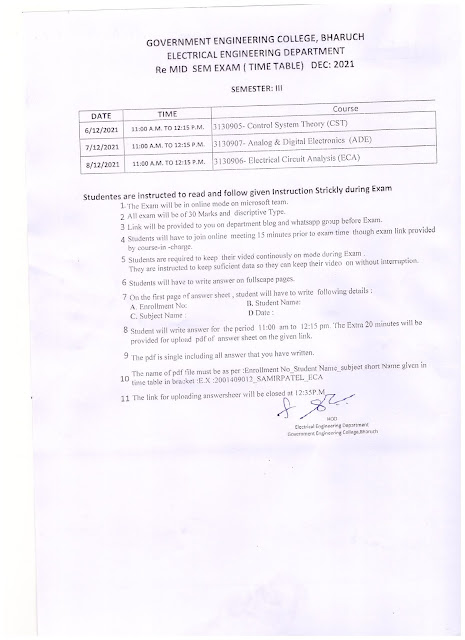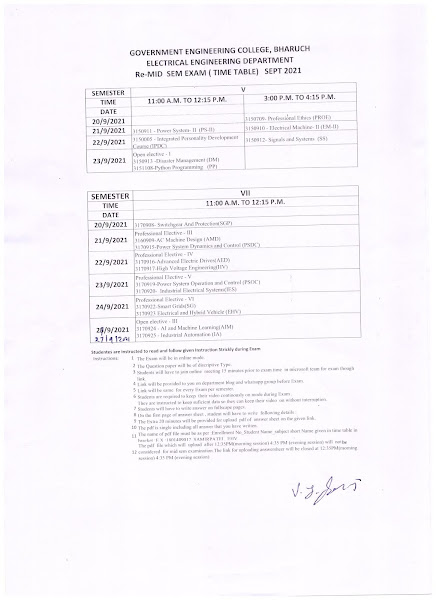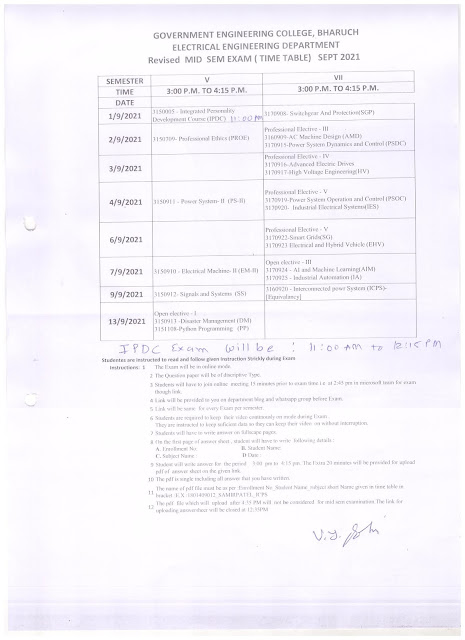Tuesday, 21 December 2021
3rd Sem Design Engineering -1A Practical Exam Schedule
Monday, 13 December 2021
verification of 5th and 7th sem Marks
Dear student ,
you can see your 5th and 7rd-semester Mid/ internal marks on the GTU portal for the two Days 14/12/2021 and 15/12/2021.
You are instructed to verify your Mid/Internal marks on the GTU portal without fail. If you found any queries, Please fill the below link. Also immediately contact your Mentor.
https://docs.google.com/forms/d/e/1FAIpQLSeoGYP1P3uBlri9SfjamTDbWHHOTGVHg76aYPva4R2mSyn9UA/viewform
If you will fail to verify your marks within given period (14th and 15th Dec) and do not give any response to your mentor, The institute can not solve your query after 17th Dec 2021.
Wednesday, 8 December 2021
Tuesday, 7 December 2021
Guidelines for CST(3130905) Submission
Instruction to Upload Practical Work : Click Here
Click Here to see Batch No with Concerned Faculty
Saturday, 4 December 2021
RE_MID Students List for Sub Code 3130905 (Control System Theory)
Thursday, 2 December 2021
Monday, 29 November 2021
Wednesday, 24 November 2021
Friday, 29 October 2021
Monday, 25 October 2021
Meeting for all Sem 6 Students
All the students of 3rd year 6th sem Electrical are hereby informed to attend Online meeting called by Head of Department Prof. Vishal Y Doshi sir by 26/10/2021 (Tuesday) @03:00 pm on Microsoft team platform. It is mandatory to attend for all students.
Joining Link: CLICK HERE
Urgent meeting related to Internship with 8th semester Students
All the 8th Semester Students of Electrical engineering department are hereby inform to remain present in meeting called by Head of Department Prof. Vishal Y. doshi sir on Microsoft Team (online mode) arranged on 26/10/2021(tomorrow) at 1:00 PM. Attendance in the meeting is compulsory.
Click on below link to join meeting.
Wednesday, 20 October 2021
Saturday, 16 October 2021
Thursday, 14 October 2021
Question bank of Analog and Digital Electronics (3130907)
Wednesday, 13 October 2021
1st Year 1st Semester Time-Table for Odd Sem 2021-22
7th sem _External _practical _viva _schedule
Tuesday, 12 October 2021
Question Bank for Sub Code: 3130905 (Control System Theory) (As per Course Outcomes and Revised Blooms Taxonomy )
Ch:1 Introduction to control problem CLICK HERE
Ch:2 Time Response Analysis CLICK HERE
Ch:3 Frequency-response analysis CLICK HERE
Ch:5 State variable Analysis CLICK HERE
Ch:4 Introduction to Controller Design: CLICK HEREMonday, 11 October 2021
Mid Sem Exam Syllabus for Sub Code: 3130905 (Control System Theory)
Wednesday, 6 October 2021
Power system-II joining link for batch A only on 07/10/2021-11 am onwards
Schedule:
190140109001 to 190140109019: at 11:00 AM
190140109020 to 190140109047: at 2:00 PM
190140109048 to 190140109065: at 4:00 PM
Wednesday, 29 September 2021
SGP (7th sem. mid + Re-mid Marks) (Subject code: 3170908)
Tuesday, 28 September 2021
Offline internship information for 3rd and 5th semester students
All students of 3rd and 5th semester are hereby informed to issue an No objection certificate from the department if they are interested to apply for 15 or 30 days of offline internship.
Wednesday, 22 September 2021
Tuesday, 21 September 2021
List of students for Remedial Mid-Sem exam for Signals and System
Signals and Systems (3150912) - 5TH SEMESTER MID SEM EXAM RESULT
Monday, 20 September 2021
5th Semester_Introduction to Motors & Motor Control Lecture Series _ Electrical Machines – II (3150910)
FEEDBACK FORMAFTER WATCHING GIVEN VIDEO LECTURE SERIES.
Saturday, 18 September 2021
KINDLY CONSIDER THIS AS PYTHON RESULT OF MID SEM
| Enrollment No | Name | TOTAL |
| 190140109003 | Karan Vinit Arekar | 27 |
| 190140109005 | BHADURIYA ABHISHEK A | 24 |
| 190140109007 | BHATT HARSH | 21 |
| 190140109008 | JAYNISH VIJAYBHAI BHAVSAR | 24 |
| 190140109011 | Sahil Jiteshbhai Chaudhari | 21 |
| 190140109012 | RAKESH CHAUDHRY | 25 |
| 190140109013 | CHAUDHRY SAHIL K | 23 |
| 190140109014 | DHARMIK ASHWINBHAI CHAUHAN | 26 |
| 190140109015 | CHAUHAN JAYDEEP M | 18 |
| 190140109016 | Krushna Vijay Chauhan | 27 |
| 190140109017 | ABHINAV CHAUDHRY | 22 |
| 190140109020 | Priyesh Prakash kumar Dave | 25 |
| 190140109023 | GAYAKWAD RAHUL R | 24 |
| 190140109027 | GORITYALA OMNI A | 16 |
| 190140109028 | SANNY GOND | 23 |
| 190140109033 | JAYSWAL VISHAL S | 20 |
| 190140109034 | JHA DEEPAKKUMAR R | 17 |
| 190140109048 | LAKDAWALA JINAL | 24 |
| 190140109049 | LALAKIYA JAY | 20 |
| 190140109053 | Mahato Shailesh kumar Shambhu prashad | 27 |
| 190140109059 | MISHRA DHARMESH R | 18 |
| 190140109065 | NEPALI KHUSHBU K | 28 |
| 190140109066 | DEVANSH NIM | 22 |
| 190140109067 | KAUSHIK PAL | 25 |
| 190140109071 | JAY JASHVANTLAL PARMAR | 28 |
| 190140109079 | DHRUVIL VIRALBHAI PATEL | 21 |
| 190140109087 | Kevin Ajit bhai Patel | 17 |
| 190140109089 | PATEL MAYANKKUMAR J | 21 |
| 190140109092 | NEELKUMAR JITENDRABHAI PATEL | 23 |
| 190140109093 | PATEL NIDHI J | 25 |
| 190140109094 | PATEL NEELAM M | 22 |
| 190140109098 | Pruthvi Dharmendrabhai Patel | 27 |
| 190140109104 | Vedangkumar Manojkumar Patel | 25 |
| 190140109108 | PATIL AMOL C | 16 |
| 190140109111 | VISHAL K PRASAD | 22 |
| 190140109114 | RANA MIHIR M | 25 |
| 190140109118 | SAHADAPURI AMAN V | 19 |
| 190140109121 | SATPATHI GAURAV S | 25 |
| 190140109122 | ABDUL SAMAD KHAIRUL BASHAR SHAH | 26 |
| 190140109123 | SHEIKH SABAPRAVIN M | 20 |
| 190140109125 | NITYAY RANJEET S | 24 |
| 190140109126 | SHUKLA RIPAL C | 24 |
| 190140109128 | DIGVIJAY SINGH | 24 |
| 190140109129 | HARSHIT SINGH | 24 |
| 190140109133 | ARJUN SURANI | 16 |
| 190140109140 | TANK RAXIT | 16 |
| 190140109141 | TANYA YASH P | 20 |
| 190140109142 | TIRGER HARSHAD M | 20 |
| 190140109143 | VADAVARIYA SAHIL | 24 |
| 190140109144 | Rushikumar Parbatbhai Vala | 27 |
| 190140109145 | Jayendrabhai Vijaybhai Vasava | 16 |
| 190140109147 | VASAVA VATSAL A | 20 |
| 190140109150 | Abhishek Amarnath Yadav | 25 |
| 190140109153 | Siddharth Kumar Yadav | 24 |
| 200140109502 | Mittal Shantilal Vasava | 12 |
| 200140109508 | SAHIL SANJAY BHAI SANKALIYA | 23 |
| 200140109514 | Drawn S. Suthar | 21 |
| 200140109515 | Ayushy Arunkumar Suthar | 20 |
| 200140109516 | PARIYA DARSHAN P | 23 |
| 200140109520 | Rakibahmed Mohamedshafi Shaikh | 16 |
| 200140109527 | PARMAR JANINSHKUMAR Z | 22 |
| 200140109529 | YASH RASIKLAL KHANDHAR | 24 |
5TH SEMESTER PYTHON MID SEM EXAM RESULT
| Enrollment No | Name | TOTAL |
| 190140109003 | Karan Vinit Arekar | 27 |
| 190140109005 | BHADURIYA ABHISHEK A | 24 |
| 190140109007 | BHATT HARSH | 21 |
| 190140109008 | JAYNISH VIJAYBHAI BHAVSAR | 24 |
| 190140109011 | SAHIL CHAUDHRY J | 20 |
| 190140109011 | Sahil Jiteshbhai Chaudhari | 21 |
| 190140109012 | RAKESH CHAUDHRY | 25 |
| 190140109013 | CHAUDHRY SAHIL K | 23 |
| 190140109014 | CHAUHAN DAHRMIK A | 25 |
| 190140109014 | DHARMIK ASHWINBHAI CHAUHAN | 26 |
| 190140109015 | CHAUHAN JAYDEEP M | 18 |
| 190140109016 | Krushna Vijay Chauhan | 27 |
| 190140109017 | ABHINAV CHAUDHRY | 22 |
| 190140109020 | Priyesh Prakash kumar Dave | 25 |
| 190140109023 | GAYAKWAD RAHUL R | 24 |
| 190140109027 | GORITYALA OMNI A | 16 |
| 190140109028 | SANNY GOND | 23 |
| 190140109033 | JAYSWAL VISHAL S | 20 |
| 190140109034 | JHA DEEPAKKUMAR R | 17 |
| 190140109048 | LAKDAWALA JINAL | 24 |
| 190140109049 | LALAKIYA JAY | 20 |
| 190140109053 | Mahato Shailesh kumar Shambhu prashad | 27 |
| 190140109059 | MISHRA DHARMESH R | 18 |
| 190140109065 | NEPALI KHUSHBU K | 28 |
| 190140109066 | DEVANSH NIM | 22 |
| 190140109067 | KAUSHIK PAL | 25 |
| 190140109071 | PARMA JAY J | 26 |
| 190140109071 | JAY JASHVANTLAL PARMAR | 28 |
| 190140109079 | DHRUVIL VIRALBHAI PATEL | 21 |
| 190140109087 | Kevin Ajit bhai Patel | 17 |
| 190140109089 | PATEL MAYANKKUMAR J | 21 |
| 190140109092 | PATEL NEELKUMAR J | 21 |
| 190140109092 | NEELKUMAR JITENDRABHAI PATEL | 23 |
| 190140109093 | PATEL NIDHI J | 25 |
| 190140109094 | PATEL NEELAM M | 22 |
| 190140109098 | Pruthvi Dharmendrabhai Patel | 27 |
| 190140109104 | Vedangkumar Manojkumar Patel | 25 |
| 190140109108 | PATIL AMOL C | 16 |
| 190140109111 | VISHAL K PRASAD | 22 |
| 190140109114 | RANA MIHIR M | 25 |
| 190140109118 | SAHADAPURI AMAN V | 19 |
| 190140109121 | SATPATHI GAURAV S | 25 |
| 190140109122 | ABDUL SAMAD KHAIRUL BASHAR SHAH | 26 |
| 190140109123 | SHEIKH SABAPRAVIN M | 20 |
| 190140109125 | NITYAY RANJEET S | 24 |
| 190140109126 | SHUKLA RIPAL C | 24 |
| 190140109128 | DIGVIJAY SINGH | 24 |
| 190140109129 | HARSHIT SINGH | 24 |
| 190140109133 | ARJUN SURANI | 16 |
| 190140109140 | TANK RAXIT | 16 |
| 190140109141 | TANYA YASH P | 20 |
| 190140109142 | TIRGER HARSHAD M | 20 |
| 190140109143 | VADAVARIYA SAHIL | 24 |
| 190140109144 | Rushikumar Parbatbhai Vala | 27 |
| 190140109145 | Jayendrabhai Vijaybhai Vasava | 16 |
| 190140109147 | VASAVA VATSAL A | 20 |
| 190140109150 | Abhishek Amarnath Yadav | 25 |
| 190140109153 | Siddharth Kumar Yadav | 24 |
| 200140109502 | Mittal Shantilal Vasava | 12 |
| 200140109508 | SAHIL SANJAY BHAI SANKALIYA | 23 |
| 200140109514 | Drawn S. Suthar | 21 |
| 200140109515 | Ayushy Arunkumar Suthar | 20 |
| 200140109516 | PARIYA DARSHAN P | 23 |
| 200140109520 | Rakibahmed Mohamedshafi Shaikh | 16 |
| 200140109527 | PARMAR JANINSHKUMAR Z | 22 |
| 200140109529 | YASH RASIKLAL KHANDHAR | 24 |
Friday, 17 September 2021
7th Semester_SMART GRIDS( 3170922) Mid semester Exam Result_Sept-2021
Thursday, 16 September 2021
Electrical and hybrid vehicle(3170923) Mid Semester Result-2021
REmid Exam TIME table __5thsem and 7th sem Student.
Wednesday, 15 September 2021
Power System-II (3150911) mid semester-2021 Result
5th_Sem_sub:EM-2(3150910)_MIDSEMEXAM_Sept_2021_RESULT
Tuesday, 14 September 2021
5th Sem_subject_PROE_mid_result_SEPT_2021_(GTU_WINTER_2021)
MidSem_Marksheet_PEC-III_3170915_PSDC_2021_ELECTRICAL_7th_Semester
Monday, 13 September 2021
Notice regarding Remid Exam Of 4th ,5th, 6th 7th , 8th sem
Dear Students,
Hereby it is informed that re-mid exam for the students of electrical engineering department (who could not secure passing marks in the mid-exam conducted in SEPT-2021 and those who have a backlog in the previous mid-sem exam) will be conducted on 20th September Onwards. The Detail timetable will be displayed soon.
In short: Re-mid Exam will start on 29th Sept for the semester 4th,5th,6th,7th,8th
Those students who will have to appear in this re-mid Exam fill below link up to 19th September 2021
Tuesday, 7 September 2021
4th sem Mid exam _Summer_2021 _ Marks _verification
Saturday, 4 September 2021
Mid sem syllabus for PYTHON for semester 5
Friday, 3 September 2021
Question bank of Industrial Electrical System(3170923)
Thursday, 2 September 2021
Question bank of Electrical and hybrid vehicle(3170923)
Wednesday, 1 September 2021
Teacher's day celebration (શિક્ષકદિનની ઉજવણી )
આથી સર્વે વિધ્યુત વિભાગના વિધ્યાર્થીઓને જણાવવાનુકે તા: ૪ સપ્ટેમ્બરે શિક્ષકદિનની ઉજવણી કરવાની હોય તેના ભાગરૂપે અલગ અલગ પ્રવૃતિઓ વિધ્યાર્થીઓ દ્વારા કરવાનું નક્કી કરેલ છે.ઉજવણીનો સમય ૧૧:૦૦ કલાક થી ૧૩:૦૦ સુધીનો રહેશે. જે વિધ્યાર્થીઓને શિક્ષકદિનની પ્રવૃતિઓમાં ભાગ લેવામાં રશ હોઈ તેમણે નીચે દર્શાવેલ ગુગલ લિન્કમાં માહિતી તા: ૩/૯/૨૦૨૧ ના રોજ બપોરના ૧૨:૦૦ વાગ્યા સુધીમાં ભરવાની રહેશે.
વિધ્યાર્થીઓ નીચે દર્શાવેલ પ્રવૃતિઓમાં ભાગ લઈ શકે છે. આ ઉપરાંત પ્રસંગને અનુરૂપ લાગતી અન્ય કોઈ પ્રવૃતિ દર્શાવી શકે છે.
Link for Activity
Tuesday, 31 August 2021
Important Notice for 5th semester
Tomorrow exam time for subject IPDC will be 11:00 am to 12:15 pm. All are informed to join link at 10:45 am.
This is for tomorrow only.
Sunday, 29 August 2021
MID SEM Syllabus for the Subject Industrial Automation (7th sem Open Elective Subject)
MID SEM Syllabus (7th Sem, Electrical Open Elective Subject)
Industrial Automation
Subject Code: 3170925 , Semester – VII
Introduction:
Automation overview, Requirement of automation systems, Architecture of
Industrial Automation system, Introduction of PLC and supervisory control and
data acquisition (SCADA). Industrial bus systems: modbus & profibus. Role
of computers in measurement and control.
Automation
components: Sensors for temperature, pressure, force, displacement, speed,
flow, level, humidity and pH measurement. Actuators, process control valves,
power electronics devices DIAC, TRIAC, power MOSFET and IGBT. Introduction of
DC and AC servo drives for motion control.
Programmable logic
controllers: Programmable controllers, Programmable logic controllers,
Analog digital input and output modules, PLC programming, Ladder diagram, PLC Communication and networking, PLC
selection, PLC Installation, Advantage of using PLC for Industrial automation,
Application of PLC to process control industries.
Friday, 27 August 2021
List of Nonregistered Students in Design Engineering I A 3rd Sem
Question Banks for SMTG (3170922) (7TH SEM) 2021
Thursday, 26 August 2021
Question Bank Of The COurse_ Professional Ethics (3150709)
Wednesday, 25 August 2021
Tuesday, 24 August 2021
Power System-II(3150911) Mid semester Examination Syllabus-september-2021
Monday, 23 August 2021
MID SEM_SYLLABUS_Electrical and Hybrid Vehicle_3170923_7th SEM_ODD SEM_2021-22
Semester
– VII Subject
Name: Electrical and Hybrid Vehicle
Subject Code: 3170923
MID SEMESTER EXAM SYLLABUS
1. Introduction to Electric Vehicle:
History of Electric Vehicles, Development towards 21st Century, Types of Electric Vehicles in use today – Battery Electric Vehicle, Hybrid (ICE & others), Fuel Cell EV, Solar Powered Vehicles. Motion and Dynamic Equations of the Electric Vehicles: various forces acting on the Vehicle in static and dynamic conditions.
2. Induction to Hybrid Electric Vehicle:
Social and environmental importance of hybrid and electric vehicles, impact of modern drive-trains on energy supplies. Hybrid Electric Drive-trains: Basic concept of hybrid traction, introduction to various hybrid Drive-train topologies, power flow control in hybrid drive-train topologies, fuel efficiency analysis.
3.Electric Drive Trains:
Basic concept of electric traction, introduction to various electric drive- train topologies, power flow control in electric drive-train topologies, fuel efficiency analysis. Electric Propulsion unit: Introduction to electric components used in hybrid and electric vehicles, Configuration and control of DC Motor drives, Configuration and control of Induction Motor drives, configuration and control of Permanent Magnet Motor drives, Configuration and control of Switch Reluctance Motor drives, drive system efficiency.
4. Introduction to Energy Storage Requirements in Hybrid and Electric Vehicles
Battery based energy storage and its analysis, Fuel Cell based energy storage and its analysis, Super Capacitor based energy storage and its analysis, Flywheel based energy storage and its analysis, Hybridization of different energy storage devices. Sizing the drive system: Matching the electric machine and the internal combustion engine (ICE)
Course Outcomes:
After completing the course, students will be able to;
Sr. No. | CO statement |
CO-1 | Select appropriate source of energy for the hybrid electric vehicle based on driving cycle. |
CO-2 | Analyze the power and energy need of the various hybrid electric vehicle. |
CO-3 | Measure and Estimate the energy consumption of the Hybrid Vehicles. |
CO-4 | Evaluate energy efficiency of the vehicle for its drive trains. |
MID SEM_SYLLABUS_SMART GRID_3170922_7th SEM_ODD SEM_2021-22
Semester – VII Subject
Name: Smart grids
Subject Code: 3170922
MID
SEMESTER EXAM SYLLABUS
|
Chapter No. |
Content |
|
1 |
Basics of Load and Generation, Grid operation, Concepts of Power Flow Analysis, Economic Dispatch and Unit Commitment. Introduction to Smart Grid, Difference between conventional & smart grid, Architecture of Smart Grid, Smart Grid standards, Policies Applications, Smart Grid control layer and elements, Smart Grid Initiative for Power Distribution Utility in India. |
|
3 |
Distributed generation resources, Advantages and disadvantages of DG, Distributed Generation Utilization Barriers, Distributed Generation integration to power grid Smart Grid components control elements, Smart Grid Technologies |
|
4 |
Micro Grids, Concept of micro grid, need & applications of micro grid, formation of micro grid, Modelling of AC Smart Grid components, Modelling of DC Smart Grid components, Modelling of storage devices, issues of interconnection, Operation, protection & control of micro grid. Simulation and case study of AC micro grid Islanding, need and benefits, different methods of islanding detection. |
|
5 |
Load dispatch centers, Sensor Networks, Phasor Measurement Units, Communications Infrastructure, Fault Detection and Self-Healing Systems, Applications and Challenges, , wide-area monitoring system (WAMS), Phasormeasurement units PMU; Smart sensors/telemetry, advanced metering infrastructure(AMI);smart metering; smart grid system monitoring, |
Course Outcomes:
After completing the course, students will be able to;
|
Sr. No. |
CO statement |
|
CO-1 |
Summaries various aspects of the smart grid Technologies, Components,Architectures and Applications |
|
CO-2 |
Study and compare modern communication infrastructure and justify the feasibility of the same for smart grid applications. |
|
CO-3 |
Analyze Micro grid and distributed generation as a part of modern hybrid powersystem with advantages and challenges in smart gird operations |
|
CO-4 |
Use of load modeling techniques, Demand Side Ancillary Services EnergyManagement in Pricing and Energy Consumption Scheduling in smart gridoperations |
Syllabus of MID_Exam_Sept_2021_Power system Operation And control_2170919
1. Automatic Generation Control and Voltage Control: Introduction;
Load Frequency Control (Single Area Case); Load Frequency Control and Economic Despatch Control; Two-Area Load Frequency Control; Optimal (Two-Area) Load Frequency Control; Automatic Voltage Control; Load Frequency Control with Generation Rate Constraints (GRCs); 8
2. Reactive Power and Voltage Control: Introduction;
Reactive power requirement of an uncompensated line; Implication of surge impedance loading; Reactive loss characteristics of transmission line; Operation of a transmission line at no load condition; Operation of a transmission line under heavy loading condition; Voltage regulation of the transmission line and its relation with reactive power; Maximum power transfer in an uncompensated line; Line loadability. Reactive powervoltage (Q-V) coupling concept; Operational aspects in reactive power and voltage control; Basic principle of system voltage control; Reactive power flow constraints and their implications in loss of voltage; Power System Voltage Stability : Introduction, Difference between angle stability and voltage stability, Causes of voltage instability, types, proximity and mechanism of voltage stability, Practical aspects of reactive power flow problems leading to voltage collapse in EHV lines. 10
3. Power System Security: Introduction;
System State Classification; Security Analysis; Contingency Analysis; Sensitivity Factors: generation shift distribution factor, line shift distribution factor
4.Load Forecasting: Introduction;
Forecasting Methodology; Estimation of Average and Trend Terms; Estimation of Periodic Components; Estimation of ys(k): Time Series Approach; Estimation of Stochastic Component: Kalman Filtering Approach; Long-Term Load Predictions Using Econometric Models; Reactive Load Forecasting.
Course Outcome
CO-1 Apply concepts of frequency control and voltage control in small sample single area power system
CO-2 Analyze performance of transmission lines with respect to reactive power requirement for voltage stability
CO-4 Describe concepts of power system security and load forecasting
Mid Sem Exam Syllabus for Odd Sem AY 2021-22_7 TH SEM_PEC IV_3170917 – HVE
Electrostatic fields and field stress control:
Electrical field distribution and breakdown strength of insulating materials - fields in homogeneous, isotropic materials - fields in multi-dielectric, isotropic materials.
Numerical analysis of electrical fields in high voltage equipment:
numerical methods - Charge simulation method (CSM), Finite Difference Method (FDM), Finite Element Method (FEM), The boundary-element method, Comparative summary, Formulation of the finite-element equations in two and three dimensions - Forming the functional equation, The energy functional illustrated, Numerical representation.
Electrical breakdown in gases:
Gases as insulating media - ionization and decay processes, Townsend first ionization coefficient, photo ionization, ionization by interaction of metastable with atoms, thermal ionization, deionization by recombination, deionization by attachment–negative ion formation, examples - cathode processes – secondary effects, photoelectric emission, electron emission by positive ion and excited atom impact, thermionic emission, field emission, Townsend second ionization coefficient, secondary electron emission by photon impact, examples - transition from non-self-sustained discharges to breakdown, the Townsend mechanism, examples - the streamer or ‘kanal’ mechanism of spark, examples - the sparking voltage– Paschen’s law, penning effect.
Breakdown in liquid :
Liquid as insulators, breakdown in liquids - electronic breakdown, suspended solid particle mechanism, cavity breakdown, examples - static electrification in power transformers, transformer oil filtration, transformer oil test, alternative liquid insulations like vegetable oils, esters and silicon oils.
Generation of high voltages:
Generation of high direct voltages, half and full wave rectifier circuits, voltage multiplier circuits, Van de Graff generators, electrostatic generators, examples - generation of alternating voltages, testing transformers, cascaded transformers, resonant transformers, examples - impulse voltages, Standard lightning and switching surge and associated parameters and their corrections, design and construction of impulse voltage generator circuits, Marx circuit, operation, examples - impulse current generator.
Measurement of high voltages:
High direct voltage measurement, peak voltage measurements by spark gaps, sphere gaps, reference measuring systems, uniform field gaps, rod gaps, factors affecting sphere gap measurements, examples - electrostatic voltmeters - ammeter in series with high ohmic resistors and high ohmic resistor voltage dividers.
High voltage testing:
Testing of insulators and bushings, testing of isolators and circuit breakers Testing of cables, testing of transformers - testing of surge diverters.
Course Outcome:
1. Apply numerical methods for engineering problem. (Applying) -20%
2. Recall breakdown mechanism for dielectric materials in solid, liquid and gaseous state. (Remembering) -20%
3. Classify insulation test techniques. (Understanding) -20%
4. Examine methods for generation of test high voltage and as well for its measurement. (Analyzing).-20%












